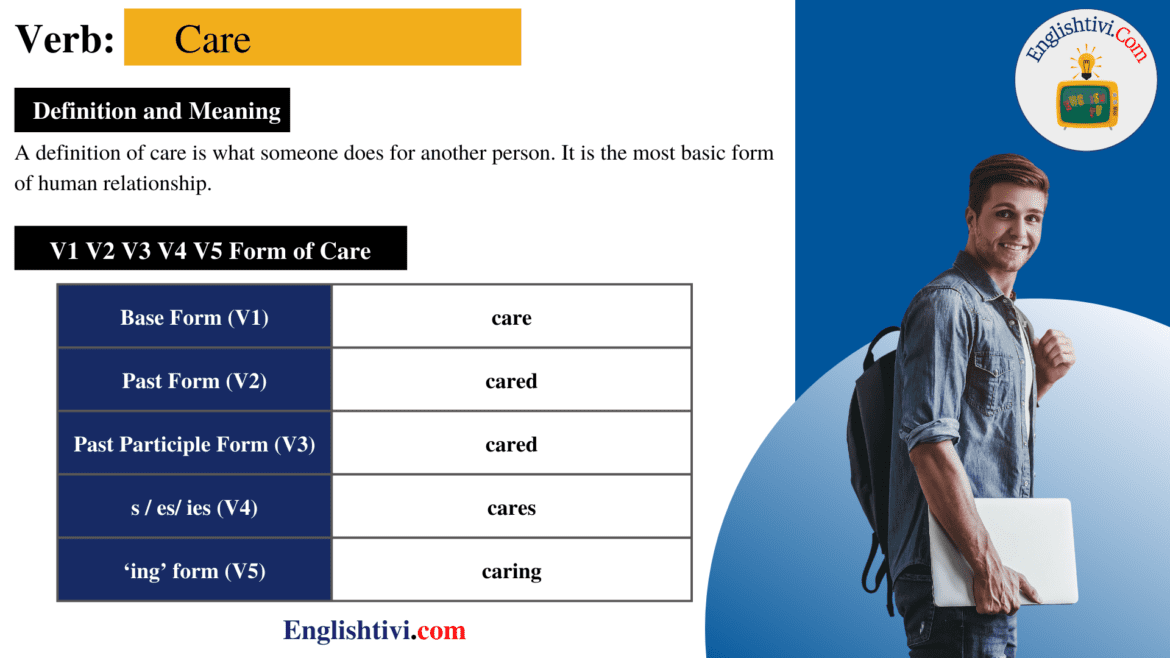Care V1 V2 V3 V4 V5 is one of the verbs that are used very commonly in English tests as well as in everyday communication. Also, because it’s an irregular verb, care doesn’t follow the regular rule. The verb “care” has five different forms: base form, past simple, past participle form, present perfect, and present perfect participle. So what is care‘s past? How do conjugate verbs with care verbs?
⏩ Sign Up to Get Bonus
Let’s find out with English tivi in the article below.
See more at: Verbs
Care of Definition and Meaning
A definition of care is what someone does for another person. It is the most basic form of human relationship.
V1 V2 V3 V4 V5 Form of Care
| Base Form (V1) | care |
| Past Form (V2) | cared |
| Past Participle Form (V3) | cared |
| s / es/ es (V4) | cares |
| ‘ing’ form (V5) | caring |
Care of Past Simple V2
The verb Care is also employed in its V2 form as “cared”’. It is used to indicate the past tense in sentences.
Care of Past Participle V3
The V3 form is identical to the V2 form. The V3 form is “cared”. Cared is used in the past or present perfect tense.
+ In the present perfect tense, we use the word V1 as ‘have + cared‘ or ‘has + cared'.
- I, you, and we are used as ‘have + cared‘.
- ‘has + cared' is used for he, she, and it.
+ If you need to use the past perfect tense, use ‘had + cared‘ regardless of the subject.
You might also like: ALL the English Grammar Basics You Need
Conjugation of Care V1 V2 V3 V4 V5
| Conjugation table: Care | |||
| Number | Singular | ||
| Present Simple of care | I | You | She/He/It |
| care | care | cares | |
| Plural | |||
| We | You | They | |
| care | care | care | |
| Present Continuous of care | I | You | She/He/It |
| am caring | are caring | is caring | |
| Plural | |||
| We | You | They | |
| are caring | are caring | are caring | |
| Present Perfect of care | I | You | She/He/It |
| have cared | have cared | has cared | |
| Plural | |||
| We | You | They | |
| have cared | have cared | have cared | |
| Present Perfect Continuous of care | I | You | She/He/It |
| have been caring | have been caring | has been caring | |
| Plural | |||
| We | You | They | |
| have been caring | have been caring | have been caring | |
| Past Simple of care | I | You | She/He/It |
| cared | cared | cared | |
| Plural | |||
| We | You | They | |
| cared | cared | cared | |
| Past Continuous of care | I | You | She/He/It |
| was caring | were caring | was caring | |
| Plural | |||
| We | You | They | |
| were caring | were caring | were caring | |
| Past Perfect of care | I | You | She/He/It |
| had cared | had cared | had cared | |
| Plural | |||
| We | You | They | |
| had cared | had cared | had cared | |
| Past Perfect Continuous of care | I | You | She/He/It |
| had been caring | had been caring | had been caring | |
| Plural | |||
| We | You | They | |
| had been caring | had been caring | had been caring | |
| Future Simple of care | I | You | She/He/It |
| will/shall care | will/shall care | will/shall care | |
| Plural | |||
| We | You | They | |
| will/shall care | will/shall care | will/shall care | |
| Future Continuous of care | I | You | She/He/It |
| will/shall be caring | will/shall be caring | will/shall be caring | |
| Plural | |||
| We | You | They | |
| will/shall be caring | will/shall be caring | will/shall be caring | |
| Future Perfect of care | I | You | She/He/It |
| will/shall have cared | will/shall have cared | will/shall have cared | |
| Plural | |||
| We | You | They | |
| will/shall have cared | will/shall have cared | will/shall have cared | |
| Future Perfect Continuous of care | I | You | She/He/It |
| will/shall have been caring | will/shall have been caring | will/shall have been caring | |
| Plural | |||
| We | You | They | |
| will/shall have been caring | will/shall have been caring | will/shall have been caring | |
| Conditional Present of care | I | You | She/He/It |
| would care | would care | would care | |
| Plural | |||
| We | You | They | |
| would care | would care | would care | |
| Conditional Perfect of care | I | You | She/He/It |
| would have cared | would have cared | would have cared | |
| Plural | |||
| We | You | They | |
| would have cared | would have cared | would have cared | |
| Conditional Present Continuous of care | I | You | She/He/It |
| would be caring | would be caring | would be caring | |
| Plural | |||
| We | You | They | |
| would be caring | would be caring | would be caring | |
| Conditional Perfect Continuous of care | I | You | She/He/It |
| would have been caring | would have been caring | would have been caring | |
| Plural | |||
| We | You | They | |
| would have been caring | would have been caring | would have been caring | |
| Present Subjunctive of care | I | You | She/He/It |
| care | care | care | |
| Plural | |||
| We | You | They | |
| care | care | care | |
| Past Subjunctive of care | I | You | She/He/It |
| cared | cared | cared | |
| Plural | |||
| We | You | They | |
| cared | cared | cared | |
| Past Perfect Subjunctive of care | I | You | She/He/It |
| had cared | had cared | had cared | |
| Plural | |||
| We | You | They | |
| had cared | had cared | had cared | |
| Imperative of care | I | You | She/He/It |
| care | |||
| Plural | |||
| We | You | They | |
| Let’s care | care | ||
See more at: Vocabulary
Example Sentences with Care V1 V2 V3 V4 V5
In this section, we will learn about care sentence examples:
- My sister is caring for my mother for me.
- Jack will care for the children.
- Alice is well cared for by her friends.
- He always cares about what others say about him.
- She cared for the house for me.
Synonym Words For Care
Synonym of care word list. Here are a variety of words whose meaning is nearly the synonym of care:
- support
- maintain
- sustain
- foster
- nurture
- raise
- guard
- facilitate
- accommodate
- nourish
- baby sit
- minister
Opposite Words For Care
The antonym of care word list. Here are some words that have nearly the opposite meaning as care:
- abandon
- leave
- neglect
- desert
- ditch
- forsake
- dump
- discard
- leave
- behind
- forget
- not care
You might also like: Best List of Irregular Verbs in English
Some Frequently Asked Questions About Care (Verb)
What is the V1 V2 V3 V4 V5 of care?
The past tense of care is cared. The third-person singular simple present indicative form of care is cares. The present participle of care is caring. The past participle of care is cared.
| Base Form (V1) | care |
| Past Form (V2) | cared |
| Past Participle Form (V3) | cared |
| s / es/ es (V4) | cares |
| ‘ing’ form (V5) | caring |
What is the V2 and V3 form of care?
+ The V2 and V3 form of care is “cared“.
What is the sentence of care?
What is the past tense V2 of care?
+ The past tense of care is “cared“.
What is the past participle V3 of care?
+ The past participle of care is “cared“.
What is the present participle V5 of care?
+ The present participle of care is “caring“.
Conclusion
Let’s learn with English TV the structure of the verb “Care V1 V2 V3 V4 V5“: Base Form, Past Simple, Present Continuous and Present Continuous and Present Continuous and Present Continuous forms. We wish you all the best of luck.
You should subscribe to the English TV YouTube channel if you want to learn more about the English language and improve your proficiency.





